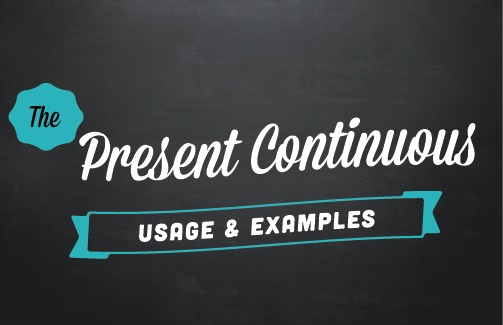Using the Present Continuous Tense

We use the present continuous tense in several different ways in English. These explanations and many examples will help you master this tense and feel confident about when to use it.
Before we get started, please note that this is often also called the present progressive tense. The words "continuous" and "progressive" tell us that the action is continuing or in progress.
[Note: Click here to learn how to form the present continuous.]
Present continuous tense use #1:
Actions happening NOW
We use the present continuous to talk about things that are happening now / right now / at this moment / at this very moment. The action started sometime in the past and is still happening now.
For example:
- What am I doing? I'm talking to you right now.
- I'm watching a movie at the moment.
- Something smells good. What are you cooking?
- Ssh! The children are sleeping now.
- Sorry, he can't come to the phone. He's eating dinner.
- You can call him at the office. He's working until 7 o'clock.
Use #2: Present temporary actions
We use this tense to talk about situations that are temporarily happening.
Frequent phrases used with this meaning are at the moment / these days / for or during the next week / year / semester / etc.
For example:
- We're living in London for the next two years.
- We're renting a house at the beach for the rest of the summer.
- I'm working as a cashier until I graduate college.
- My husband is taking a three-month holiday from work.
- They're staying with us until they find an apartment.
- I'm leaving in a few minutes.
Use #3: Longer actions that are in progress
We can also use the present continuous to describe actions that are in progress but won't be finished for a longer period of time. Note that we don't have to be doing the activity at this exact moment.
For example:
Sarah walks into the library and sees her friend. She walks over to speak to her:
- Sarah: What are you reading?
- Jennifer: I'm reading an article for my class.
Note: In these examples, the action is happening right now.
Sam and Joe are drinking coffee and chatting at a café:
- Sam: Are you reading any good books these days?
- Joe: Yes, I'm reading an interesting spy novel.
Note: In this example, Joe is not reading the spy novel at this moment. He started the book some time ago and will continue reading it a little bit at a time during the next few weeks. He's at a café and the book is at his home on the table next to his bed).
More examples:
|
Action Happening right now Call me later, I'm studying right now. Are you working late tonight? I'm eating broccoli and potatoes. |
An action in progress over longer time I'm studying chemistry this semester. Are you still working at McDonalds'? My son's not eating enough vegetables. |
Use #4: Definite plans in the near future
We use the present continuous tense for actions that we're planning to do in the near future.
Note: With this usage, we are using the present tense to describe an event happening in the future.
For example:
- We're meeting at the restaurant tonight at 8 PM.
- I'm going out with the guys this evening.
- Are you working tomorrow?
- Serena Williams is playing Maria Sharapova in the finals tomorrow.
- Is she moving next week?
- We aren't practicing today because of the rainy weather.
Use #5: To describe irritating habits
We can use this tense to describe irritating habits—annoying things that someone is "always," "continually," or "constantly" doing.
For example:
- I'm always forgetting to bring my lunch.
- She's constantly complaining about something.
- Ugh! Why are you always playing video games?
- My neighbors are constantly arguing and fighting.
- Why are you continually asking me where I'm going?
- I wish you weren't always criticizing me.
Use #6: To describe something changing or developing
We can also use the present continuous tense to describe things that are changing or slowly developing over time:
For example:
- It's getting darker earlier each evening.
- My sister's health is slowly improving.
- My hair is finally growing out.
- Your English is getting better and better.
Final notes
I recommend you also review the differences between the present simple and present continuous tenses.
If you need to review how to form the present continuous tense please check this page. I go over the positive and negative forms, questions, spelling and give lots of examples.
- Home Page ›
- Main Grammar Page ›
- Form: Present Continuous >
- Use: Present Continuous
